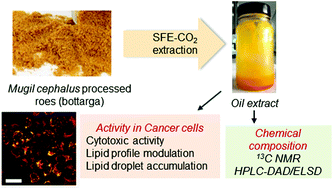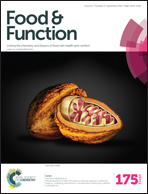Mugil cephalus roe oil obtained by supercritical fluid extraction affects the lipid profile and viability in cancer HeLa and B16F10 cells
Abstract
We explored the changes in viability and lipid profile occurring in cancer cells, murine melanoma cells (B16F10 cells) and human cervical carcinoma cells (HeLa cells), when exposed to 24 h-treatments with an n-3 PUFA-rich oil obtained by supercritical extraction with CO2 from Mugil cephalus processed roe (bottarga). The composition of the major lipid classes of bottarga oil was determined by the 13C NMR technique. Reversed-phase HPLC with DAD/ELSD detection was performed to analyze cells’ total fatty acid profile and the levels of phospholipids, total/free cholesterol, triacylglycerols, and cholesteryl esters. Cell-based fluorescent measurements of intracellular membranes and lipid droplets were performed on bottarga oil-treated cells using the Nile red staining technique. The treatments of cancer cells with bottarga oil reduced the viability and affected the fatty acid profile, with a significant n-3 PUFA increase in treated cells. Mullet roe oil uptake modulated the cancer cell lipid composition, inducing a remarkable incorporation of health beneficial n-3 PUFA in the polar and neutral lipid fractions. Bottarga oil treatment influenced the synthesis of intracellular membranes and accumulation of cytoplasmic lipid droplets in cancer cells.


 Please wait while we load your content...
Please wait while we load your content...